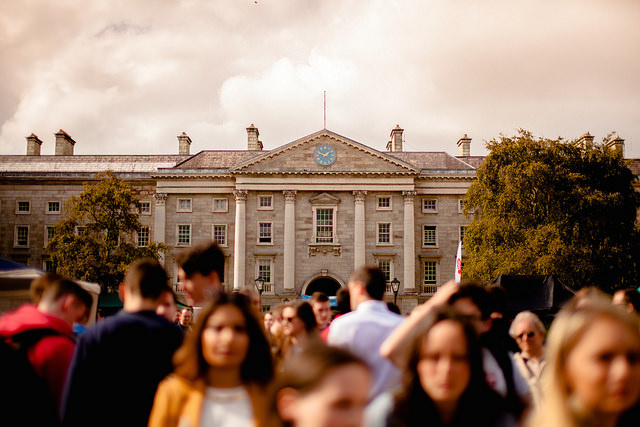Ninety per cent of Trinity Access Programme (TAP) first-year students stay in College, according to the latest figures from the College’s Equality Office.
The most recent Annual Equality Monitoring Report shows that TAP saw a retention rate of 90 per cent for first-year students, a considerable success for a programme that has guided thousands of students into third-level in recent years.
In 2016, the programme saw 286 students – its highest number ever – enter Trinity.
The report, which is published by the Equality Office, shows that the programme has a progression and completion rate of 91 per cent. It also reveals that the most common degree awarded to TAP students from 2010 to 2016 was a 2.1, with 50 per cent of students receiving the degree.
Speaking to The University Times, Aoife Crawford, the Trinity Equality Officer, said the report is designed to “measure the success of our equality and diversity initiative”. The report focuses on a wide range of areas, including gender equality and the age of Trinity’s staff.
Currently, there are 1,009 undergraduate students registered with TAP across all years, making up eight per cent of the student body. Since its launch in 1992, the number of students in TAP has grown steadily. From accepting its first five students in 1997, the programme has accepted 2,562 students in total across all years. The purpose of TAP, as stated in its mission statement, is “to widen access and participation at third-level of under-represented groups”.
According to the report, nearly half of TAP students, 46 per cent, enter the Arts, Humanities and Social Science faculty. This is significantly higher than those that go into the Engineering, Mathematics and Science or Health Science faculties, which stand at 29 per cent and 25 per cent respectively. The report also stated that the most common socio-economic background for TAP student was “Non Manual Workers”, with 31 per cent of students coming from this background.
TAP is more popular with younger students, with only 11 per cent of students who enter through TAP considered mature. The gender split in the programme is predominantly female, with the number of applicants at 60 per cent.
Crawford explained that this is something she and her team have been talking to TAP about as, compared to the CAO, where students are blindly picked regardless of gender. With TAP, she said, staff members are able to “to have an influence on the gender of who is getting in”. One of the methods the programme is employing is ensuring that “they have a good number of male role models” to visit schools and encourage younger males to apply for university, explained Crawford.
TAP students enter Trinity through the TAP Foundation Courses for Higher Education (for Young Adults and Mature Students), the Higher Education Access Route (HEAR) programme and the Trinity College Dublin and City of Dublin Education and Training Board Partnership Courses in Liberal Arts.
The programme has received much praise over the last 20 years. A notable example was the announcement by Lady Margaret Hall, a constituent college of the University of Oxford, that it would launch a four-year pilot scheme in association with Trinity.
Correction: November 8th, 2017
Due to a mistake in the original Annual Equality Monitoring Report, an earlier version of this article incorrectly stated that 36 per cent of TAP students get a 2.1. In fact, 50 per cent of students between 2010 and 2016 received a 2.1.







